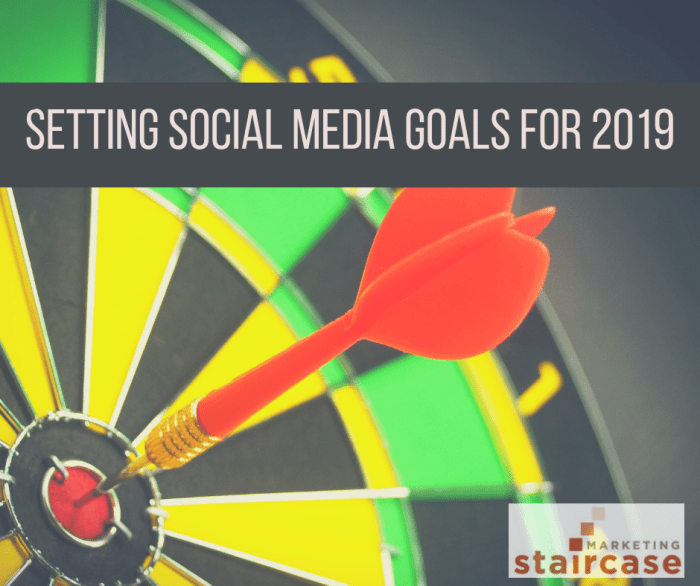Setting Social Media Goals is like mapping out your journey to social media stardom. It’s about defining your destination and paving the way for your online presence to shine brighter than the rest. Get ready to dive into the world of strategic goal-setting and watch your digital footprint skyrocket!
Importance of Setting Social Media Goals
In today’s digital age, setting social media goals is essential for businesses and individuals looking to establish a strong online presence. By defining clear objectives, you can effectively strategize and measure your success on various social media platforms.
Impact on Overall Success
- Increased Brand Awareness: Setting goals for social media can help increase brand visibility and reach a wider audience.
- Engagement and Interaction: Well-defined goals can drive higher engagement rates and foster meaningful interactions with your followers.
- Lead Generation: By setting specific goals for lead generation, businesses can convert social media followers into potential customers.
- Measurable Results: Having clear objectives allows you to track progress, analyze data, and adjust strategies for better outcomes.
Benefits of Clear Objectives
-
Guided Strategy:
Setting social media goals provides a roadmap for your online activities and helps you stay focused on your objectives.
-
Improved ROI:
Clear goals enable you to measure the return on investment of your social media efforts and allocate resources effectively.
-
Enhanced Content Strategy:
Defined objectives can help tailor your content to resonate with your target audience and achieve desired outcomes.
-
Competitive Advantage:
Having specific goals gives you a competitive edge by optimizing your social media presence and staying ahead of the competition.
Types of Social Media Goals
In the world of social media marketing, different types of goals can be set to achieve desired outcomes. It is crucial to understand the various categories of social media goals to effectively drive your digital marketing strategies and measure success.
Brand Awareness
Brand awareness is a common social media goal that focuses on increasing visibility and recognition of a brand among the target audience. This goal is essential for businesses looking to establish a strong presence in the market and attract new customers. Strategies to achieve brand awareness goals may include creating engaging content, running targeted ad campaigns, and collaborating with influencers.
Metrics to measure brand awareness include reach, impressions, and social mentions.
Lead Generation
Lead generation is another vital social media goal that aims to capture potential customers’ interest and convert them into leads. This goal is crucial for businesses looking to expand their customer base and increase sales. Strategies for lead generation may involve offering valuable content, running lead generation ads, and implementing email marketing campaigns. Metrics to measure lead generation include click-through rates, conversion rates, and lead quality.
Community Engagement
Community engagement is a social media goal that focuses on building relationships with the target audience and fostering a sense of community around the brand. This goal is essential for businesses looking to create brand loyalty and advocacy among customers. Strategies for community engagement may include responding to comments and messages, running interactive contests, and hosting live events. Metrics to measure community engagement include likes, comments, shares, and overall engagement rates.
Aligning Goals with Marketing Objectives
It is crucial to align social media goals with the overall marketing objectives to ensure coherence and effectiveness in your digital marketing efforts. By aligning social media goals with broader marketing goals such as increasing sales, expanding market share, or launching a new product, businesses can create a unified strategy that drives results and maximizes ROI.
Unique Strategies and Metrics for Different Goals
Each social media goal requires unique strategies and metrics for measurement to track progress and evaluate success effectively. For example, while brand awareness goals may focus on increasing reach and impressions, lead generation goals may prioritize conversion rates and lead quality. By tailoring strategies and metrics to specific goals, businesses can optimize their social media efforts and achieve desired outcomes efficiently.
Strategies for Setting Effective Social Media Goals: Setting Social Media Goals

Setting effective social media goals is crucial for the success of any digital marketing strategy. Here are some key strategies to help you create specific, measurable, achievable, relevant, and time-bound (SMART) goals for your social media platforms.
Creating SMART Goals
- Specific: Clearly define what you want to achieve on each social media platform. For example, increase brand awareness on Instagram.
- Measurable: Set quantifiable metrics to track progress, such as gaining 1000 new followers on Facebook within a month.
- Achievable: Ensure that your goals are realistic and attainable based on your resources and capabilities.
- Relevant: Align your social media goals with your overall marketing objectives to ensure they contribute to the larger strategy.
- Time-bound: Establish a deadline for achieving your goals to create a sense of urgency and focus.
Examples of SMART Social Media Goals, Setting Social Media Goals
- Facebook: Increase post engagement by 20% within three months by posting more interactive content.
- Instagram: Boost website traffic by 15% in two months through the use of shoppable posts and influencer collaborations.
- LinkedIn: Generate 50 new leads per month by sharing industry-specific content and engaging with relevant groups.
Regularly Reviewing and Adjusting Goals
Regularly monitoring the performance of your social media goals is essential to determine what is working and what needs adjustments. By analyzing data such as engagement rates, click-through rates, and conversion rates, you can make informed decisions on refining your strategies. Be flexible and willing to adapt your goals based on performance data to ensure continuous improvement and success in your social media efforts.
Key Metrics for Tracking Social Media Goals

In order to evaluate the success of your social media goals, it is crucial to monitor key metrics that provide insights into your performance and engagement with your audience. By tracking essential metrics such as engagement rate, conversion rate, and reach, you can measure the effectiveness of your social media strategies and make informed decisions to optimize your goals.
Engagement Rate
Engagement rate is a key metric that indicates how actively your audience is interacting with your content. It measures the level of likes, comments, shares, and other forms of engagement on your posts. A high engagement rate signifies that your content is resonating with your audience and driving meaningful interactions.
Conversion Rate
Conversion rate measures the percentage of users who take a desired action, such as making a purchase or signing up for a newsletter, after interacting with your social media content. By tracking conversion rate, you can assess the effectiveness of your social media campaigns in driving valuable outcomes and conversions.
Reach
Reach indicates the total number of unique users who have seen your social media content. It provides insights into the visibility and exposure of your posts to a wider audience. By monitoring reach, you can gauge the effectiveness of your content distribution and audience reach on social media platforms.
Using Analytics Tools
Analytics tools such as Google Analytics, Facebook Insights, and Twitter Analytics can help you measure progress towards achieving your set social media goals. These tools provide valuable data and insights on key metrics, audience demographics, and post performance, allowing you to track your performance and make data-driven decisions.
Interpreting Data for Optimization
Interpreting data is essential for making informed decisions and optimizing your social media strategies. By analyzing key metrics and performance data, you can identify trends, patterns, and areas for improvement to enhance your social media goals. Data interpretation enables you to refine your strategies, tailor your content, and drive better results on social media platforms.












